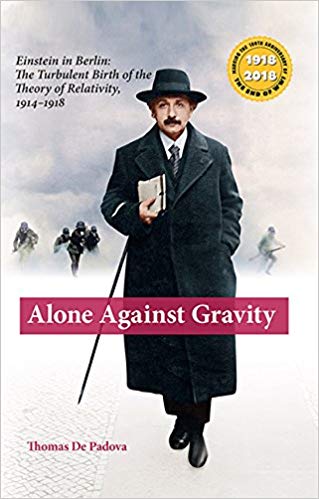 2015 German Science Book of the Year
2015 German Science Book of the Year
Translated from German by Michal Schwartz
And now for something completely different for #germanlitmonth ….
… the turbulent birth of Einstein’s general theory of relativity during the years 1914-1918. A bit of a challenge for someone like me who, following a meltdown due to a physics exam at the age of 15, has never broached the subject again. And yet, to give de Padova and and Einstein’s down-to-earth illustrations their due, I managed to stay the course most of the way through the relativity of simultaneity, the intricacies of spacetime, a new theory of gravitation, and much more. Just don’t expect me to explain any of it in my own words!
My awe for Einstein’s brainpower knows no bounds. All these theories, born mostly from thought experiments, proofs of which are still being tested today. It takes genius and an almost superhuman focus to stick at it during a time of the most intense distraction. But then that was what Einstein moved to Berlin for. For theoretical research. He did not want to be pestered with mundanities such as teaching, lecturing, and practical application. He was promised research posts, and that is what persuaded him to moved from Zurich to Prussian Berlin.
It might seem strange that a free-thinking pacifist such as Einstein would move to Prussia, the most rigid and militaristic state in Germany, but his science was calling him. The war clouds were gathering, and the storm was not long in breaking. Einstein’s Swiss citizenship served as a kind of protection. He wasn’t called upon to make the choices his colleagues had to, and it dismayed him that some took to war research so enthusiastically. In the detailing of the the background and the war efforts of Einstein’s contemporaries, Paul Haber’s crazed development of poison gas is particularly chilling. (See footnote 1.) And yet, Einstein, holding onto moral values that had been declared invalid by his environment, did not cut himself off from his peers. “Contact is nevertheless maintained through the purely intellectual, especially through natural physics”, he wrote.
De Padova shows that he needed these men to bounce his ideas off. Why couldn’t he discuss them with his Mileva, his clever wife? They used to discuss and theorise before the children were born. She had been side-lined, before they even left Zürich, by Einstein’s meaningful relationship with his cousin Elsa. Mileva did move to Berlin, and endured some pretty shabby treatment from her husband, before deciding to return to Switzerland. (See footnote 2) The separation from his boys, when Mileva had had enough, hit Einstein the hardest. He didn’t give a toss about their mother.
The chemist Haber, too, was hard-hearted towards his spouse. Suffering from loss of status and opportunity that resulted from being a wife and mother in those days, Clara Haber descended into depression. But Haber, as previously noted was crazed with poisonous gases, flitting around the battlefields of Europe to witness their deployment and efficacy. Unable to stand the horror of her husband’s actions, she shot herself after the first deployment of poison gas in Belgium.
De Padova has produced a history that is fascinating on many levels: the broader historical context of WWI, the personal and flawed lives of the scientists themselves, and that whole other universe of theoretical physics. Most interesting to read the German point-of-view, with slight divergences from conventional British wisdom, in particular how Kaiser Wilhelm wasn’t the bad guy (at least at the start). But, as discussed, De Padova spares no-one: strengths and weaknesses are held up to the mirror and scrutinised with at times breathe-taking honesty. Who knew a prize-winning science book could be so readable?
——————-
Footnote 1 – a madness reciprocated in full on the British side …
Footnote 2 – definition of shabby – see the conditions of a tyrant. Extract from page 76.
